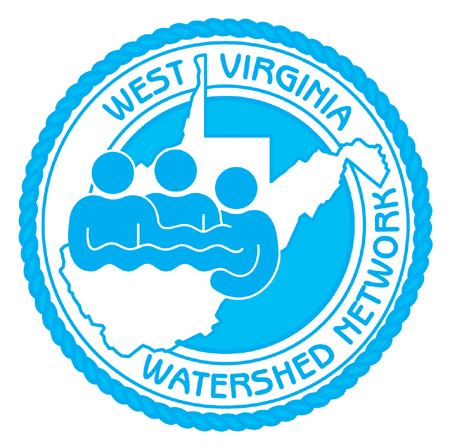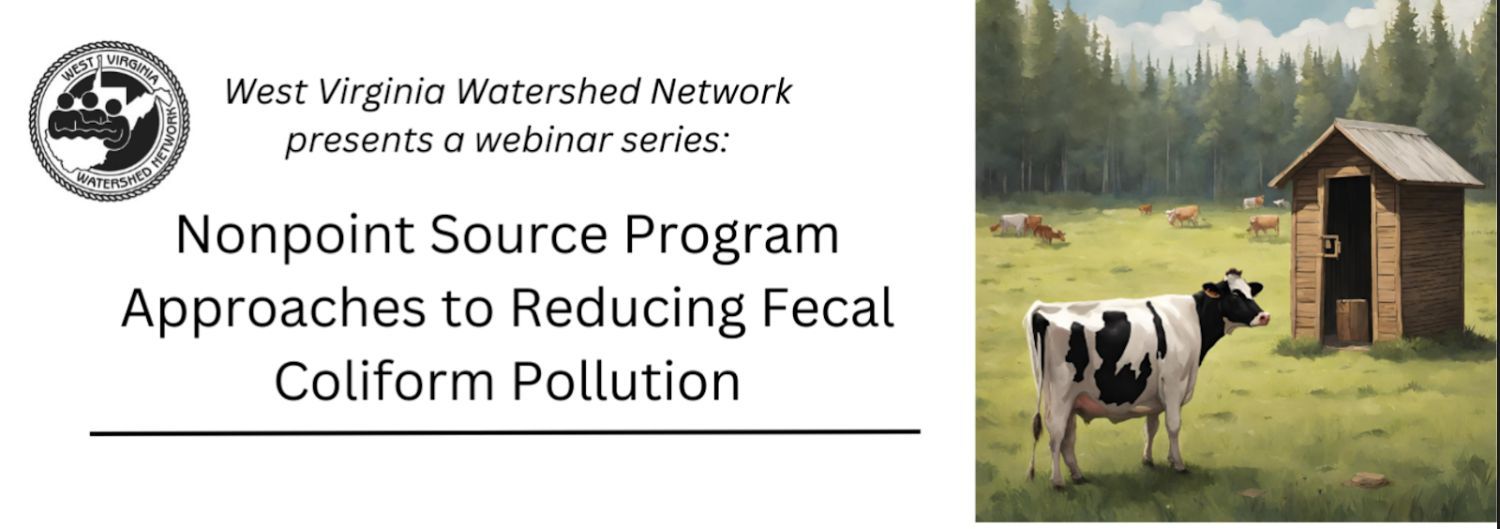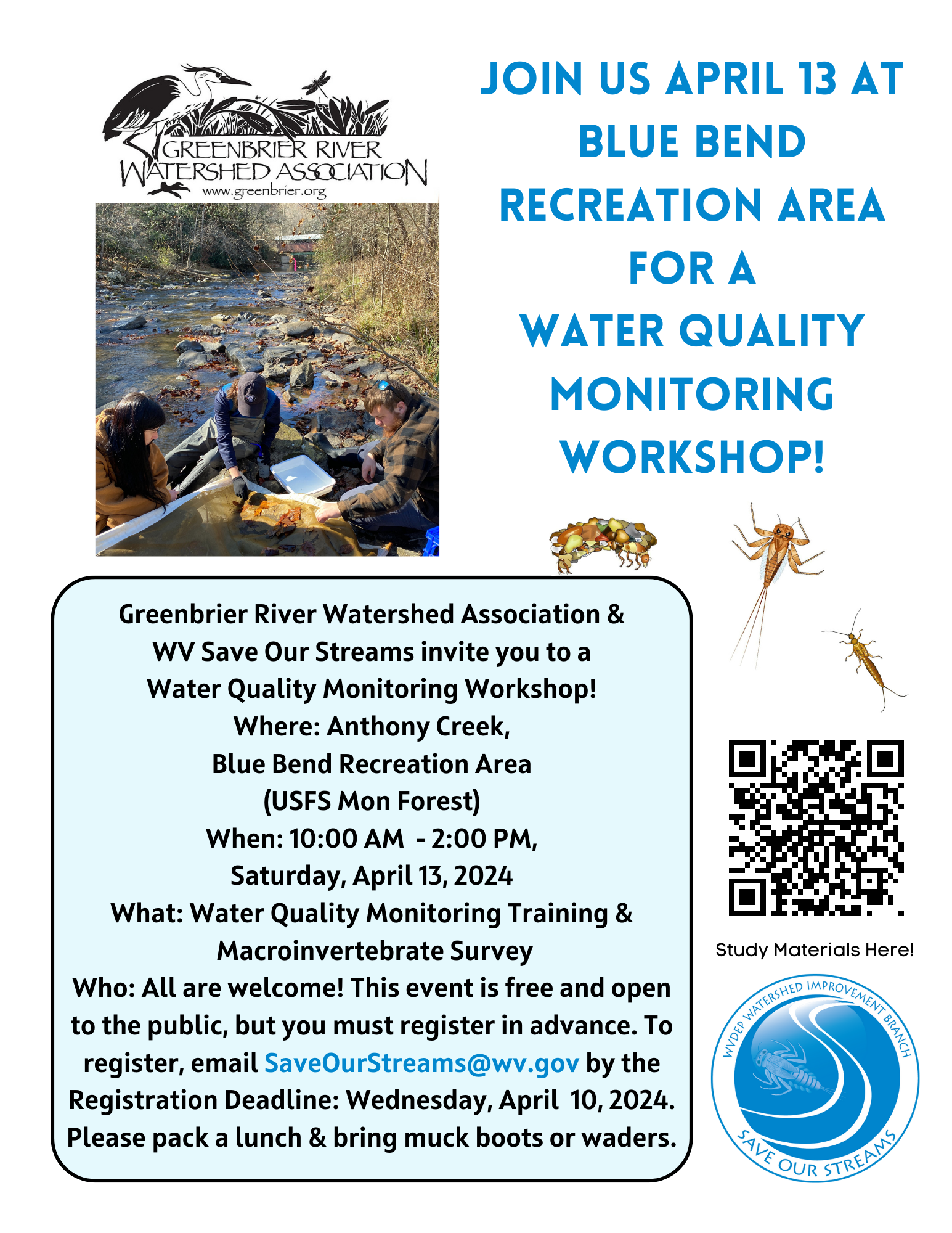 | | WV WaterNet: Winter/Spring 2024 |
| | WVWN Completed Fecal Coliform Webinar Series By: Martin Christ |
|
|
| One of the purposes of the West Virginia Watershed Network (WVWN) is to provide training to watershed associations. We decided to put together a series of webinars about decreasing fecal coliform bacteria in streams. Of course, the discussion wasn’t that direct. There were a lot of thoughts about what we did know and what we didn't know. We did know the following things: - WVWN and WVDEP’s Watershed Improvement Branch (WIB) can show groups the path to get on to restore AMD streams (it’s a long long road!).
- Fecal coliform pollution is one of the two kinds of pollution that cause the most streams in the state to fail to meet water quality standards (the other is iron, which is an indicator of sediment problems).
- Recent fecal coliform NPS projects have tried to reduce bacteria in streams by pumping, repairing, or replacing septic tanks and leach fields and by installing best management practices to control pasture runoff.
- WIB was involved in the Ashland project in McDowell County, which got away from the one-tank-and-leach-field-per-house model.
- There are people out there who are involved with out-of-the-box projects like Ashland and we should explore what they know.
After some twists and turns, the series included these topics and presenters: - Septic pumping and repair projects funded by the Nonpoint Source Program by Kristen Bisom and Kara Grosso
- An introduction to Underground Injection Control permits by Dennis Burns
- The Case of Bull Run (in the Buckhannon River Watershed) by Martin Christ
- Tracking fecal coliform bacteria to the source and calculating loads by James summers
- The science of preventing fecal coliform pollution by Dennis Burns
- Pasture BMPs and restoring brook trout to streams by Sam Urban
- Perspectives of a PSD Operator by Barry Milam
- Alternatives to single-house leach fields and other innovations by Rick Hertges
- Planning and community involvement in the Ashland Project by Jennifer Liddle
- An Introduction to the Clean Water State Revolving Fund by Kathy Emery
Recorded webinars, as well as most of the on-line presentations, are available on the WVWN Watershed Group Resources page here: https://wvrivers.org/resources/watershed/ |
|  | WVWN graphic for their webinar series on Nonpoint Source Program Approaches to Reducing Fecal Coliform Pollution. There is an image of a cow next to an outhouse. The graphic was created with CanvaAI. |
| Here are some of the things I learned from the series: - Septic systems must be protected and maintained! Pump those tanks! Clear the brush off the leach field!
- Bacteria travel with sediment! If you slow erosion into streams, you do a lot to reduce bacteria.
- Don’t assume sewered areas are taken care of. There can be leaks, and there can be unconnected houses.
- There are people out there who have worked a lot on this topic! There is plenty to learn.
- There is no one-size-fits-all solution to the problem. Find experts with knowledge and experience.
- Details matter! There’s plenty to learn about soils, treatment systems, budgeting, administration, and more.
The most important lesson, however, can be stated in a positive or a negative way. If the residents of an area don’t want sewage treatment, it is not going to happen. On the other hand, if the residents want sewage treatment, it can be established! WVWN will be compiling a final resource page, and will add it to the watershed organization resources page when it is ready. |
| | Reminder: Schedule Your Save Our Streams Workshop |
|  | | The first SOS workshop will be April 13th at Blue Bend Recreation Area. |
|
|
Now is the time to schedule your Save Our Streams (SOS) water quality monitoring workshop, if you haven’t already done so! The SOS spring and summer schedule is filling up fast. Check out the Watershed Improvement Branch calendar and filter by ‘SOS’ to view scheduled workshops. During a Save Our Streams training workshop, participants learn how to evaluate water quality of wadeable rivers and streams by examining the stream habitat, conducting chemical analysis, and studying the biodiversity of benthic macroinvertebrate communities. If your watershed association is interested in hosting a workshop, please contact Callie at callie.c.sams@wv.gov. If you are interested in attending an already scheduled workshop, email SaveOurStreams@wv.gov to register, and include the date and location of the workshop in the subject line of your email. |
|
|
|
|
| | Provide Input for Your Region’s Watershed Gathering! |
| Southern
The Southern Watershed Gathering will take place on Saturday, May 4th, at Appalachian Headwaters in Lewisburg. Networking opportunities and presentations are being planned for the day. Come share your good news, tour a native nursery, and brainstorm ways to improve your watershed. Please contact Sara Prior at sara.a.prior@wv.gov to learn more about this event or RSVP here: https://forms.gle/iG4hBYfa18TiukpK7 by April 13th. |
|
|
| Western
The Western Watershed Gathering will take place late summer/fall. Please use the following form to provide input on presentation topics, food, location, and dates: https://forms.gle/2wxQx83SQrPzsrwQA. If you have any questions, reach out to DEP’s Western Basin Coordinator, Tomi Bergstrom, tomi.m.bergstrom@wv.gov. |
| Northern
The Northern Watershed Gathering will take place in early fall. If you have thoughts on presentation topics, activities, food, location, dates, etc., for this region’s gathering, please reach out to DEP’s Northern Basin Coordinator, Martin Christ - martin.j.christ@wv.gov. |
| Eastern
The Eastern Panhandle Watershed Gathering will take place in summer. If you have thoughts on presentation topics, activities, food, location, dates, etc. for this region’s gathering, please reach out to DEP’s Potomac Coordinator, Alana Hartman - alana.c.hartman@wv.gov. |
| | Funding and Opportunity Corner |
| WV Rivers Mini-Grant Program:
In 2019, WV Rivers piloted a program making small grants to community organizations to support advocacy and activism. Grant awards range from $500 – $2,500, and applications are accepted on a rolling basis. Eligible grant recipients do not need to be a 501(c)3; however, they must meet the requirements below: - Eligibility: Intended for community-based organizations with budgets under $100,000/year that seek to lead activities with an emphasis on grassroots activism and advocacy. Awards are available up to $2,500.
- Criteria: Activities must occur in WV; empower and engage citizens through activism and advocacy; align with one of the potential project areas below; and be completed within 1 year.
- Potential Projects: Event, training, petition drive, advocacy campaign, community organizing, or other project that empowers citizens to take action for clean water in West Virginia.
How to Apply: Please fill out this form. Questions? Reach out to wvrivers@wvrivers.org. |
| | EPA Webinars for Grant Assistance Agreement Applicants and Recipients EPA is hosting a series of three webinars, including Competition Process; Procurement, Subawards, and Participant Support Costs; and New EPA Davis-Bacon Grant Term and Condition. During each webinar, EPA staff will review key aspects of EPA’s grants processes and requirements, and participants will have the opportunity to submit questions. You must register in advance for each webinar. - Competition Grant Process, Tuesday, March 26, 2024, 1-2 pm. ET: This webinar intends to help grant applicants learn how to find and successfully apply for competitive EPA grants. EPA will also provide an overview of the competition process from application through evaluation and selection. Register here.
- Procurement, Subawards, and Participant Support Costs, Wednesday, March 27, 2024, 11:30-12:30 p.m. ET: This training will cover procurement regulations and requirements. Specific topics include best practices for contracts, consultants, equipment, and supply purchases; review of subawards (grant awards provided by a pass-through entity to a subrecipient); and participant support costs (payments to individuals who participate in grant activities but are not employees of the grant recipient). Register here.
- New EPA Davis-Bacon Grant Term and Condition, Thursday, March 28, 2024, 12:30-1:30 p.m. ET: This training will discuss EPA’s new Davis-Bacon Term and Condition that is required for certain programs that involve construction activities. Register here.
|
| | Expanding EPA’s Closing America’s Wastewater Access Gap Community Initiative to 150 Additional Communities The initiative partners with underserved communities to provide technical assistance on accessing federal wastewater funding. Communities will be selected on a rolling basis; there is no deadline to apply. For questions, email SepticHelp@epa.gov. Interested communities can request assistance by completing the WaterTA request form. |
| | Walmart Spark Good Local Grants Application deadline: Applications are accepted quarterly during the following periods: March 1 to April 15, May 1 to July 15, August 1 to October 15, and November 1 to December 31, 2024. Geographic scope: Communities with Walmart stores, Sam’s Clubs, and distribution centers Grant amount: $250 to $5,000 Description: Walmart’s Spark Good Local Grants aims to address the unique needs of the communities where Walmart operates in the United States. Grants are provided to organizations that operate locally and directly benefit the service area of local facilities in U.S. communities where Walmart stores, Sam’s Clubs, and distribution centers are located. Grants support a variety of organizations, such as animal shelters, elder services, and community clean-up projects. Eligible applicants include 501(c)(3) nonprofit organizations; state or local government entities, including law enforcement or fire departments; K-12 public or nonprofit private schools, charter schools, and higher education institutions; and churches or other faith-based organizations with a proposed project that benefits the community at large, such as food pantries, soup kitchens, and clothing closets. Learn more. |
| | WCAP Applications Open As part of its efforts to combat legacy coal mining pollution and create healthier communities, the Office of Surface Mining Reclamation and Enforcement is making approximately $1.3 million available for Watershed Cooperative Agreement Program (WCAP) grants to allow non-profit organizations to undertake acid mine drainage remediation projects. WCAP grants are capped at $100,000 per project to complete local acid mine drainage remediation projects. Projects can include installation of passive or active water treatment systems, including repairs and renovations. Projects can also include reclamation of lands that are contributing sediment or acid forming materials to streams. Non-profit watershed restoration groups and other non-profit organizations are invited to submit proposals for Watershed Cooperative Agreement Program grants to restore the health of local streams and provide community recreational opportunities. Applications are due by 5 p.m. EST on May 1. For more information about the WCAP grants and to apply for financial assistance, visit Grants.gov. For examples of WCAP-funded projects, visit: https://www.osmre.gov/programs/watersheds |
| | Sonic Bloom with Nina Assimakopoulos and Friends in Concert Come celebrate the forests and rivers of West Virginia with Visual Art, Music, and Storytelling! Featuring WV Driftwood Flutes, Flobal Percussion, Theramin, Dideridoo, Piano, Guitar, Cello and more! Date: April 7, 2024
Time: 4 PM
Place: WVU Falbo Theater
Get tickets: https://wvucca.universitytickets.com/w/event.aspx?id=1592 |
|  | | Contact NinaSoundArtist@gmail.com for tabling opportunities at this event. |
| | | | |
|
| | West Virginia Rivers Coalition
3501 MacCorkle Ave SE #129 | Charleston, West Virginia 25304
304-637-7201 | wvrivers@wvrivers.org |
| The WV WaterNet is made possible through an award of Environmental Protection Agency’s 319 funding awarded to the West Virginia Rivers Coalition by the West Virginia Department of Environmental Protection. |
|  | |
|
| |
|
|